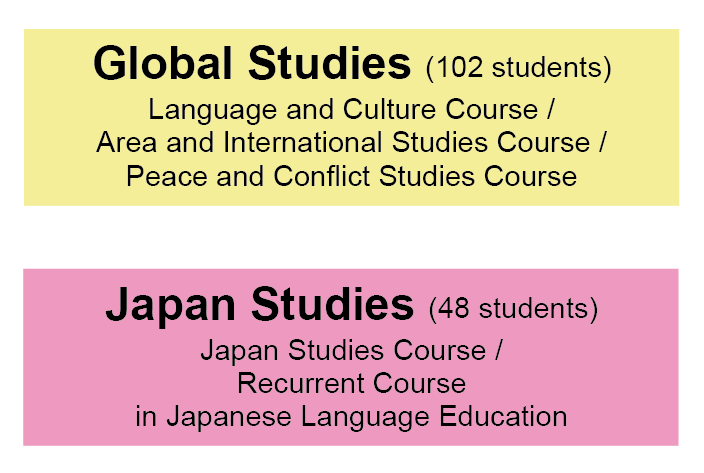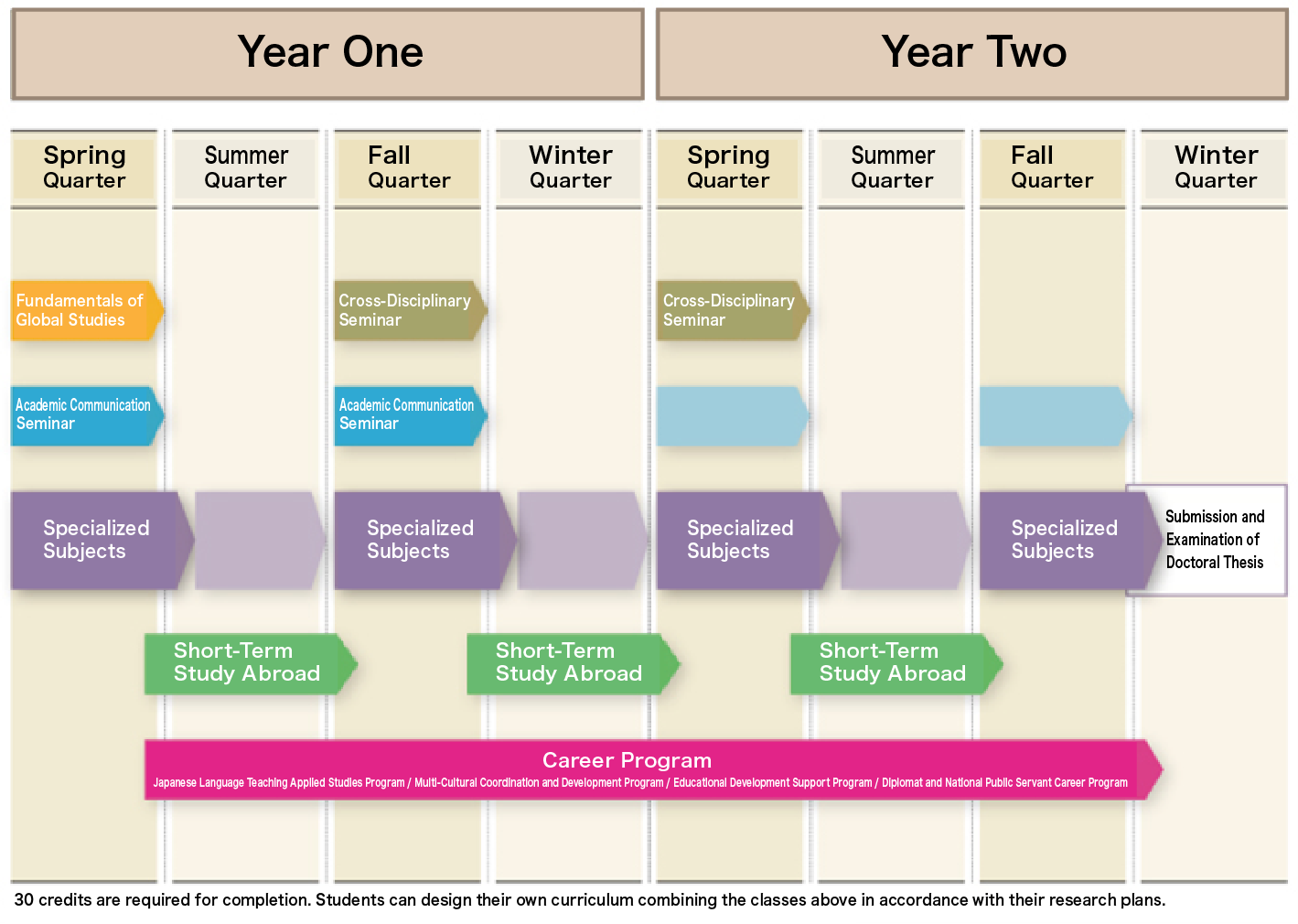Master's Programs
The Graduate School of Global Studies at Tokyo University of Foreign Studies is one of the few educational institutions in Japan engaged primarily in specific and integrated research on the languages, cultures, and societies of the world. The Graduate School’s mission is to be a core institution for research in this field internationally. We are proud of our century-old traditions of research and education on the languages, cultures, and societies of Asia, Europe, and the Americas, areas with which Japan has long been deeply engaged. Over time, the scope of education and research at our university has expanded to encompass other parts of the world, and we have now become an international hub for research and education on the languages, cultures, and societies of Southeast Asia, the Middle East, and Eastern Europe as well. We also serve as an international hub in the fields of Japan studies and Japanese language education. Under this profile, our Graduate School seeks to foster high-level professionals, including academic researchers. Making a genuine contribution to today’s increasingly globalized society requires in-depth knowledge and advanced skills in specialized fields. Our Graduate School welcomes ambitious students who aspire to active, global careers both within and beyond Japan having acquired not only research expertise, but also the integrative, practical capabilities and Japan literacy necessary for international engagement.
We offer two Master’s Programs: Global Studies and Japan Studies.

- Master's Program in Global Studies
- Master's Program in Japan Studies
- Studying in the Master’s Program (Curriculum)
- Policies (in JP)
- List of Master's Program Researchers
- Credit Transfer / Partnerships / Non-Degree Students (in JP)
Master's Program in Global Studies
The Global Studies program involves research on the languages, cultures, and societies of the world’s various regions and the international community as a whole from multiple and integrated perspectives. It trains multi-lingual, internationally-minded experts attuned to the development of a truly global society.
Language and Culture Studies Course
This course involves specialized education and research on the languages and cultures of the various regions of the world, in order to cultivate experts with advanced linguistic knowledge and integrated perspectives on the regions they study.
Areas of specialization:
English and English Language Pedagogic Studies, European and American Languages Studies, Asian and African Languages Studies, Linguistic Studies, Phonetics Studies, Linguistics and Information Science Studies, Cognitive Science Studies, Applied Translation and Interpreting Studies, European and American Cultural Studies, Asian and African Cultural Studies, Classical Literature and Cultural Studies, Human Cultural Studies
Area and International Studies Course
This course involves specialized education and research on the societies of the various regions of the world and international society as a whole, in order to cultivate experts equipped with coordinating skills and resilience toward conflict. The areas the course covers are as follows.
Areas of specialization:
European and American Area Studies, Asia, African and Oceanian Area Studies, Contemporary World Studies, International Relations Studies
Peace and Conflict Studies Course (October Admission)
Peace and Conflict Studies (PCS) is an interdisciplinary research and educational program launched in 2004. It aims to fulfill the recognized need in many parts of the world for professionals with expertise in peace and conflict, violence, peacebuilding, and other related global and transnational issues. Each year the program admits a small but diverse group of individuals from all over the globe and provides them with unique opportunities to learn critical approaches to the issues of utmost importance to many people in today’s conflict-laden world. All courses are held in English.
Asian and African Field Science Program
The Asian and African Field Science Program is an add-on program extending beyond the three courses in the Global Studies program and taught by faculty members of our university’s Research Institute for Languages and Cultures of Asia and Africa.
“Field science” is a research method offering a theoretically and practically enhanced approach to fieldwork. The program uses this method to investigate the various regions of Asia and Africa.
Double-Degree Master’s Program “History in the Public Sphere”
History in the Public Sphere (HIPS) is a double-degree Master’s program that has been jointly developed by the Tokyo University of Foreign Studies and the Central European University (Hungary/Austria).
Participating students have the opportunity to spend a semester studying at the Tokyo University of Foreign Studies and several other partner universities within Europe throughout the two-and-a-half-year period. Through this study system of mobility tracks among multiple universities, students are engaged in basic learning, research, internships, and a final Thesis/Capstone Project. After successfully defending the final project, students are awarded two Master’s degrees: a Master of Arts (Humanities) from the Tokyo University of Foreign Studies and a Master of Arts in History from the Central European University.
Master's Program in Japan Studies
The Japan Studies program trains individuals to have an objective outlook on Japan and a capacity to employ comparative perspectives to study the Japanese language and Japanese language education in the context of languages across the world, and Japanese culture and society in global contexts. In the field of Japanese language education, in addition to the regular two-year course we are preparing to establish a course for practitioners that can be completed in one year.
◆Features of the Master’s Program in Japan Studies◆
Educational staff with international, cutting-edge research profiles
Education and research in the Japan Studies program is undertaken not only by full-time faculty members of our university, but also faculty members from member institutions of the Consortium for Asian and African Studies (CAAS) and the National Institute for Japanese Language and Linguistics. The member institutions of CAAS are the National Institute for Oriental Languages and Civilizations (INALCO; France), Leiden University (Netherlands), Hankuk University of Foreign Studies (South Korea), National University of Singapore, the School of Oriental and African Studies (SOAS) University of London (United Kingdom), Colombia University (United States), and Tokyo University of Foreign Studies.
Japan Studies Course
The Japan Studies Course involves research on Japan from four angles:
Japanese language
Areas of study include contemporary Japanese, Japanese linguistic history, and comparative studies of the Japanese language.
[Subjects]: Japanese Language Studies, Comparative Japanese Studies
Japanese language education
Students acquire multi-faceted approaches to Japanese language education through classes on such subjects as lexical semantics, pragmatics, grammar, theoretical linguistics, cognitive linguistics, sociolinguistics, second language acquisition, teaching methods, course design, educational materials, assessment methods, discourse analysis, and intercultural communication.
[Subjects]: Japanese Language Teaching Studies, Japanese Language Teaching Applied Studies
Japanese literature and culture
Areas of study include classical literature, contemporary literature, and cultural studies.
[Subjects]: Japanese Literature and Cultural Studies, Japanese Comparative Literature and Cultural Studies
Japanese society
Areas of study include traditional Japanese society, contemporary Japanese social problems, and Japanese history.
[Subjects]: Japanese Societal Studies, International Cultural Exchange Studies
Studying in the Master’s Program (Curriculum)
To enlarge image,please click here.
Fundamentals of Global Studies
Acquire fundamental research capabilities
This class, offered in the spring quarter of year one when students begin their graduate studies, is designed to cultivate fundamental research capabilities by equipping students with the skills of researching, presenting, and debating essential for academic research. It includes both lectures on such topics as research design and statistical methods, and opportunities for students to present their research proposals in Japanese and English. (Mandatory / 2 credits)
Specialized Subjects
Diverse, focused classes in your program/course
Taking specialized subjects is the core component of learning in graduate school. Students take classes taught by their academic advisors, associate advisors , and faculty members in related areas. This is where students pursue their Master’s research projects under supervision. In year two, students take the Master’s Thesis/Research Seminar and produce their Master’s Thesis.
Cross-Disciplinary Seminar
A forum for lively discussion beyond scholarly and regional boundaries
In this seminar, groups comprising several students interact beyond the boundaries of research field and region. The aim is for students pursuing topics in different directions to come together and gain insights to inform their own research through discussion with others. Students also find it exciting and useful to receive and apply feedback from “invited” faculty members whose areas of specialization relate to the topics discussed. (Mandatory / 2 credits)
Short-Term Study Abroad
Joint Education Programs enabling short-term study abroad
Our university offers Joint Education Programs together with our partner institutions outside Japan. There is a wide variety of short-term study abroad choices, mainly in the summer and winter terms, including opportunities to receive guidance from faculty members at partner institutions, collect materials, and undertake field research. Students can also choose from a wealth of summer courses offered at universities outside Japan.
Academic Language Seminar
Reading and presenting academic work
Seminars are offered in the following languages:
English, German, French, Italian, Spanish, Portuguese, Russian, Uzbek, Polish, Czech, Chinese, Korean, Mongolian, Indonesian, Malaysian, Filipino, Thai, Laotian, Vietnamese, Cambodian, Burmese, Hindi, Urdu, Bengali, Arabian, Persian, Turkish
TUFS Quarter System
Tokyo University of Foreign Studies operates the TUFS Quarter System in which the academic year is divided into the Spring Quarter (April to early July), Summer Quarter (mid-July to September), Fall Quarter (October to mid-January), and Winter Quarter (late January to March). No mandatory classes are scheduled in the Summer or Winter Quarters, enabling extended survey and research activities to be undertaken overseas in these periods. A Summer School operated by graduate students is also offered in the Summer Quarter.
Policies (in JP)
- Admission Policy
- Curriculum Policy
- Diploma Policy

